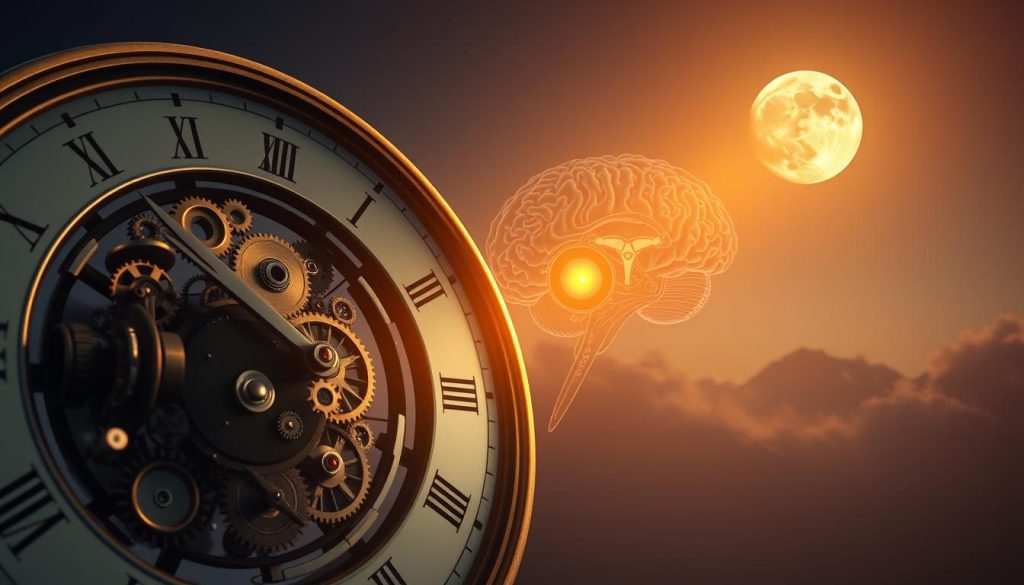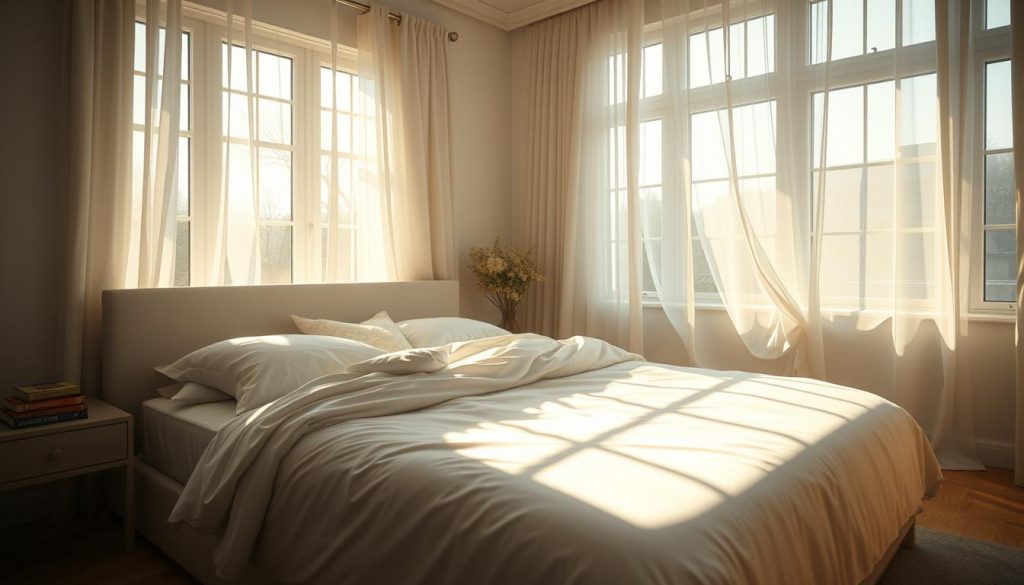Our fast-paced lives make it hard to keep our circadian rhythm in check. This internal clock is key for our sleep patterns. But, things like odd work hours, too much screen time, and travel can mess with it.
Many of us look for ways to reset our circadian rhythm. It’s vital for our sleep and health. Learning to manage sleep disorders is crucial for our well-being.
Understanding Circadian Rhythm Disruption
The circadian rhythm is like a body clock, controlling when we sleep and wake up. It changes our body and mind over a 24-hour cycle. It mainly responds to light and dark around us.
What is Circadian Rhythm?
The circadian rhythm is controlled by the brain’s SCN. It tells us when to sleep, wake, and eat. It keeps our sleep and wake times regular, helping us stay healthy. Light plays a big role in keeping this rhythm in sync with nature.
How Disruption Occurs
Many things can disrupt our circadian rhythm. Traveling to new time zones can cause jet lag. Shift work also messes with our natural rhythm because it goes against the day-night cycle. Bad sleep habits, like irregular schedules and too much screen time before bed, can also upset it.
Common Symptoms
When our rhythm is off, we might feel tired all the time. We might also have trouble sleeping or staying asleep. These signs show our body’s rhythm is out of balance. Keeping our rhythm in check is key to feeling our best.
The Role of Sleep Patterns in Circadian Rhythm
Sleep patterns play a big role in keeping our circadian rhythm healthy. A regular sleep schedule helps our bodies rest well. It also keeps our internal clocks in sync with light and temperature changes.
Irregular sleep can cause problems, like not feeling good during the day. It can also make our sleep quality worse. This can mess up our circadian rhythm, making it hard to stay alert and focused.
Here are some key points about the importance of aligned sleep patterns:
| Factors | Benefits |
|---|---|
| Consistent Bedtimes | Improved sleep quality and better daytime performance |
| Avoiding Over-Sleeping | Maintains natural sleep-wake cycles |
| Exposure to Natural Light | Helps regulate circadian rhythms |
| Limited Evening Stimulation | Promotes timely sleep onset |
Following a regular sleep schedule and creating a good sleep environment can greatly improve sleep quality. This leads to better health and well-being overall.
The Importance of the Biological Clock
The biological clock, also known as the master clock, is key to our health. It helps keep our body’s processes in sync. This internal timekeeper is vital for our well-being.
Internal Timekeeping
The SCN, in the hypothalamus, is at the center of our biological clock. It controls our sleep-wake cycles and other important functions. This network of neurons keeps our body’s rhythms steady, even without outside signals.

The Body’s Natural Cycle
Our body’s natural cycle involves light and hormonal balance. The master clock affects hormone levels like melatonin and cortisol. These hormones are important for sleep and handling stress. Keeping our biological clock in balance is crucial for our health. Disruptions can cause sleep problems, metabolic issues, and mood swings.
Melatonin Production and Its Impact
Melatonin is key in controlling our sleep patterns. It’s made by the pineal gland in the brain. This hormone tells our body when it’s time to sleep.
The light-dark cycle affects how much melatonin we make. Levels go up in the evening, helping us get ready for bed.
Melatonin helps us fall and stay asleep by making us less alert. Our ability to make it can change with age, light exposure, and lifestyle. For example, too much artificial light at night can lower melatonin levels.
This can make it hard to fall asleep and disrupt our sleep patterns. Not enough melatonin can lead to insomnia and other sleep problems. It can also cause chronic fatigue and other health issues.
Knowing how melatonin affects our sleep is vital for good health. By controlling light exposure in the evening and keeping a regular sleep schedule, we help our body make more melatonin. This leads to better sleep quality.
Challenges Faced by Shift Workers
Shift workers face unique challenges, especially when working at night. These issues can harm their health, mental state, and life quality. It’s key to understand these problems to improve work health and find ways to handle them.
Health Risks
Shift work sleep disorder is common among those with irregular hours. It causes chronic sleep loss and messes with the body’s natural cycles. This can lead to serious health problems like heart disease, obesity, diabetes, and stomach issues.
It also raises the risk of mental health issues like anxiety and depression.
Sleep-Wake Cycle Disruption
Working nights disrupts the sleep-wake cycle, making it hard to sleep regularly. This can cause constant tiredness and lower alertness, hurting work performance and safety. Fighting the body’s natural sleep urge at night makes it hard to get enough rest.
Strategies for Adaptation
There are ways for shift workers to adapt to their schedules and reduce health risks. Keeping a regular sleep schedule, even on days off, helps the body’s clock. Using blackout curtains and white noise machines can help sleep during the day.
Also, being in bright light at night and avoiding it when off-duty helps keep the body’s rhythm in sync.
Effective Ways to Reset Your Sleep-Wake Cycle
Keeping a healthy sleep-wake cycle is key for your well-being. Good sleep habits, a regular sleep schedule, and natural light are great ways to adjust your body’s clock.
Consistent Sleep Schedule
Keeping a regular sleep schedule is crucial. Go to bed and wake up at the same time every day. This helps your body get into a natural rhythm and improves sleep quality.
Bedtime Routine
A soothing bedtime routine can help you sleep better. Try reading, taking a warm bath, or relaxing exercises. These activities tell your brain it’s time to sleep, improving your sleep hygiene.
Daylight Exposure
Being in natural light during the day is important. It helps set your body’s clock. Morning sunlight tells your brain it’s time to be awake. Avoiding artificial light at night helps you sleep better.

Impact of Light Exposure on Circadian Rhythm
Light exposure greatly affects our circadian rhythm. Natural daylight and blue light from screens have different effects. Knowing these can help us sleep better.
Blue light from screens keeps us awake longer. It can make it harder to fall asleep at night. So, it’s good to cut down on screen time before bed.
Light therapy helps reset our sleep cycle. Bright light in the morning helps our body make melatonin. This keeps our rhythm in check. It’s great for shift workers and those with sleep disorders.
To manage light well, we need to balance. We should avoid blue light at night and get more natural or light therapy in the morning.
Strategies for Night Shift Workers
Working night shifts can be tough, but the right strategies can help. You can improve your sleep and feel better overall. A few simple steps can make your rest time better.
Creating a Sleep-Friendly Environment
Creating a sleep-friendly space is key for night shift workers. Blackout curtains can block out light, making your room dark and calm. This helps you sleep better. Also, keeping a regular sleep schedule is important. It helps your body adjust to the night shift.
Use of Light Therapy
Light therapy is also very helpful. Bright light in the evening helps your body stay awake. On the other hand, dim lights and less screen time before bed tell your body it’s time to sleep. Using light therapy with other strategies can help you find a good balance between work and rest.
Health Consequences of Disrupted Circadian Rhythm
Disrupting our natural sleep-wake cycle can have serious effects on our health. When our circadian rhythm is off, we face big challenges to our physical and mental health. These issues are very important and can’t be ignored.
Long-term Effects
Irregular sleep patterns can lead to serious health problems. These include heart disease, diabetes, and obesity. Our body’s metabolic processes get affected, raising the risk for these diseases. Also, our daily activities and productivity can suffer.
Mental Health Implications
Mental health also takes a hit when our sleep rhythm is disrupted. Mood disorders like anxiety and depression often come from sleep problems. Keeping a regular sleep schedule is key to our emotional health.
It’s important to study how health problems arise from disrupted sleep. This helps us understand the impact on both our minds and bodies.
| Health Consequence | Impact |
|---|---|
| Chronic Health Issues | Increased risk of cardiovascular diseases, diabetes, and obesity |
| Mood Disorders | Higher incidence of anxiety, depression, and emotional instability |
| Performance Decrement | Reduced productivity, diminished cognitive function, and decreased concentration |
Practical Tips to Improve Sleep Quality
To get better sleep, you need to change your habits and lifestyle. Here are some tips on relaxation and avoiding stimulants. They help you sleep well and support better sleep habits.
Relaxation Techniques
Doing calming activities before bed is key. It gets your body ready for sleep. Here are some popular ones:
- Meditation: It calms your mind and reduces stress.
- Breathing Exercises: Deep breathing lowers your heart rate and relaxes muscles.
- Yoga: Gentle yoga stretches help reduce tension and promote relaxation.
- Reading: A quiet reading session helps your mind unwind without screen stimulation.
Avoiding Stimulants
It’s important to cut down on caffeine, especially in the afternoon. Caffeine is a stimulant that can make it hard to fall asleep. Also, avoid nicotine and certain medications that can keep you awake.
| Stimulant | Reason |
|---|---|
| Caffeine | Interferes with the ability to fall asleep |
| Nicotine | Stimulates the nervous system, making sleep difficult |
| Alcohol | Disrupts deep sleep cycles despite initial drowsiness |
| Certain Medications | Contain ingredients that keep you awake |
By following these tips and focusing on calming activities, you can improve your sleep quality. Making these small changes can help you sleep better and enjoy more restful nights.
Role of Technology in Managing Circadian Rhythm
In today’s fast world, technology helps us manage our circadian rhythms. Wearable tech and smart home devices change how we track and better our sleep. This improves our health overall.
Sleep-Tracking Devices
Wearables like Fitbit and Apple Watch give deep sleep analysis. They watch sleep stages, heart rate, and find sleep disorders like sleep apnea. These devices help users improve their sleep habits.
Applications and Gadgets
Sleep apps like Sleep Cycle and Calm work with smart home devices for better sleep. They use sounds, light changes, and bedtime alerts. Working with devices like Philips Hue, they adjust lights to match sleep cycles. This helps keep our natural sleep rhythm.
Personal Stories: Overcoming Circadian Rhythm Disruption
Many people have successfully overcome circadian rhythm disruption. Night shift nurses, for example, made big changes to their sleep. They created dark, quiet spaces during the day and used light therapy at night.

Workers in the tech industry also shared their stories. They made lifestyle changes like regular sleep times and less caffeine. These steps helped them sleep better and feel better overall.
Shift workers in the airline industry have also found success. Pilots and flight attendants used sleep masks and earplugs. They also followed bedtime routines. These changes helped them deal with their unusual schedules and improved their health and work.
These stories show how lifestyle changes can help manage circadian rhythm issues. They prove that people can make a big difference in their sleep health.
Conclusion: Taking Control of Your Sleep
Understanding and managing your circadian rhythm is key to empowered wellbeing. This guide has shown how disruptions happen, the role of melatonin, and challenges for shift workers. It also shared ways to reset your sleep-wake cycle.
Practical steps like consistent sleep schedules, proper light exposure, and technology can help. These strategies are for a self-managed sleep routine. They help you take charge of your sleep.
By using the knowledge from this guide, you can improve your health. A good bedtime routine, natural light, and sleep-tracking devices are helpful. These steps lead to better sleep and overall health.
Improving your sleep and health is up to you. By making informed choices, you can strengthen your circadian rhythm. This journey enhances your sleep and wellbeing, leading to a healthier life.

